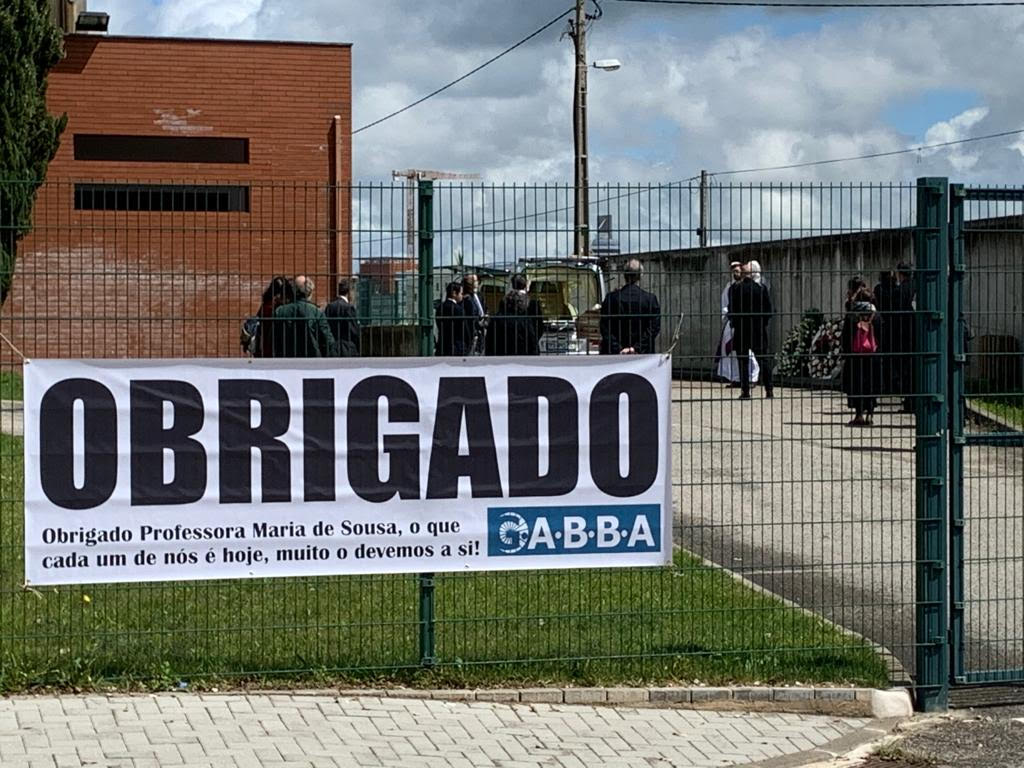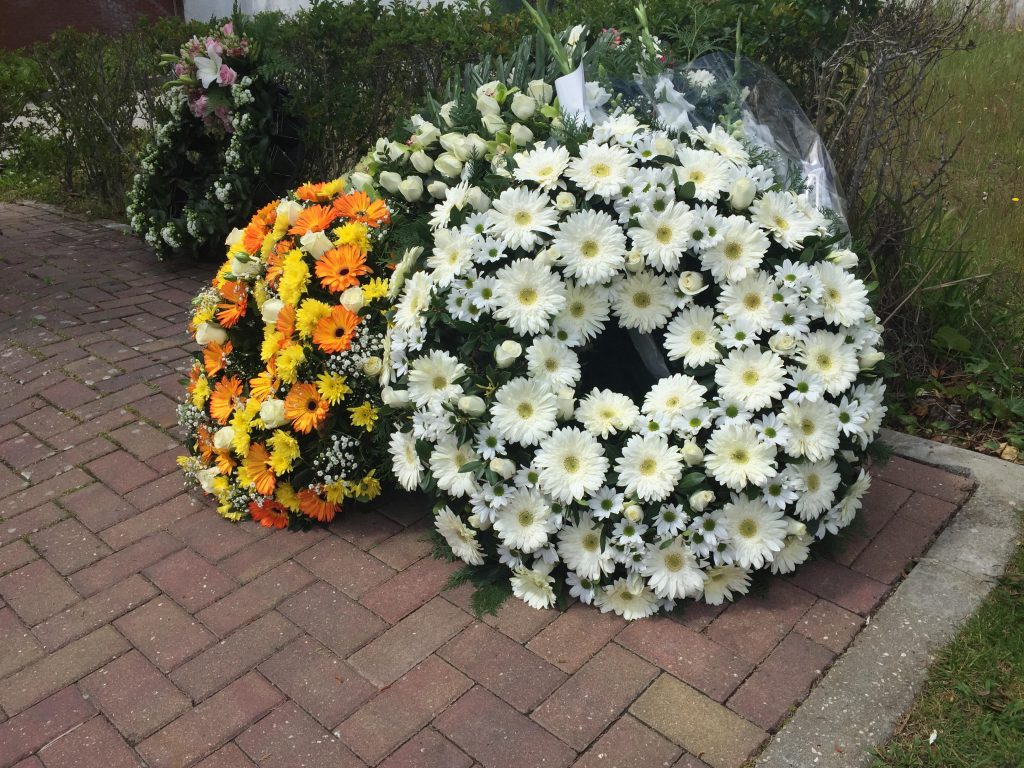“Ainda aturdido pela notícia na difícil circunstância que vivemos, tenho o dever de, ainda assim, partilhar a minha profunda mágoa. Já foi lembrado que Maria de Sousa não desacompanhou a ciência da cidadania. Enquanto atual diretor do Programa Graduado que ela criou – o seu GABBA, Programa Doutoral em Biologia Básica e Aplicada – queria lembrá-la por esta obra. Para além do seu mundo imaginado que June Goodfield tentou descrever, existe um grandioso mundo construído por ela, com poucas ajudas e muitas contrariedades. Os que conviveram com ela e os que colheram os frutos do seu trabalho, em particular a plêiade de graduados pelo seu GABBA nunca a esquecerão. Compartilham esta minha mágoa os outros cofundadores do GABBA, Professores Manuel Sobrinho Simões, Maria da Conceição Magalhães e a sua sucessora na direção do Programa, Fátima Carneiro.”
“Maria’s contributions for immunology and Portuguese Science were many but I suspect that the GABBA PhD program was the closest to her heart… a program for the future… an interdisciplinary program in biomedicine made for curious people, interested in exploring new research areas and ideas, and compelled to ask interesting questions…where learning was fun and the students were “invited” to be intellectually omnivorous….like herself….from art, to literature and music, and of course to science… our very own “school without walls…”
Her legacy are you, her scientific children. She was, as we at the GABBA coordination are, immensely proud of you…go and live your dreams..do remain curious and opened mind!
In this very sad and empty day much has been said about Maria the Professor and scientist.. but I will remember her as the inspiring person I was lucky and proud to count as my friend. Goodbye dear Maria thank you for touching our lives!”
“Prof. Maria de Sousa was a unique mind. Someone who challenged us to think broadly, to explore the frontiers of our curiosity and to cross them, without the need for papers or visas. Her world, her intellectual vision was, as has been said: “without walls”. I was not lucky to call her a friend, I have to admit. I will not even pretend she was a mentor to me. I have spent too much time 18,000 Km away for that to be the case. What I do know and always felt, though, was that she cared about me as a GABBA Alumnus, that she was an inspiration, an example of strength and determination and a source of pride. If I’m 18,000 Km away and happy doing what I love, I owe it to her vision. And for that, I will always be grateful.
With Prof. Amorim and Prof Carneiro at the helm, the GABBA program will remain the beacon of science it is.
May Prof Maria now live within all of us. Truly without walls.”
“My first conversation with Professora Maria happened in 2006, during an interview on the context of my application to the GABBA PhD program. My B.Sc final grade was 14/20 which did not place me in a good position to be admitted into very competitive PhD program, in which only 12 students would be selected from an approximate 100 applicant pool. But GABBA is not a program whose students are selected based on simplistic criteria – they are selected based on their curricular merit and, very importantly, their potential as future scientists. They are not selected just on their technical competencies, but also with the ultimate goal of forming a team, with complementary profiles. During my interview, we did not talk about my B.Sc grades, we talked about what I was passionate about in science, my motivation to move from industry to academia, the history of Sandwich (a small town in Kent, UK, where I was living at the time) and how this town’s name was linked to the sandwiches we know as snacks, why I wanted to live in California, and, finally, about the learnings of my sports career. I am convinced that if GABBA did not exist, and if Professor Maria did not lead that interview, I would never have had the opportunity to do a PhD nor the opportunity to fulfill one of my life goals: to live in California. I owe these to Professor Maria. And this is so much for someone to owe!
During my years as a GABBA student, I assimilated the values of the program: freedom, transdisciplinarity and collaborative spirit. Other programs will mention that these values are also the ones guiding them, but very few would know how or have the courage to implement them in their plenitude. Would they allow their students to go anywhere in the world, no strings attached, hoping that some of them would come back to Portugal to apply the knowledge they gathered while abroad or even contribute to the development of Portuguese science while being abroad? Would they respect their intellectual freedom by exposing them to classes on a very wide portfolio of scientific areas and allow them to pick their area of specialisation? Would they have the vision of selecting and evaluating people focusing on collective criteria instead of individual ones? It was not an easy task, the one to create and to maintain a program with these characteristics. I have heard how hard it was/is many times from Professor Maria, the “mother” of GABBA as we students fondly call her, and also from Professors António Amorim, Sobrinho Simões, Fátima Carneiro, Castro Lopes and Alexandre do Carmo.
During my time as a GABBA student, Professor Maria was always present and accessible, and she always knew how to listen and always had a lot to say. Her findings related to the “ecotaxis” theory and its corollaries have a lot of parallels with the concept of the stem cell niche, which was the focus of my PhD studies. For this reason, at the end of each of my presentations in the GABBA annual meetings, an immunologist and a stem cell biologist, would engage on a conversation about the importance of in vivo studies, which fully-respect the complexity of Biology, about cell migration, about how “homes” can be built inside tissues and “populations are governed” inside them. She was a mentor, for me and for many of the GABBA students. A little before I finished my PhD, in 2012, Professor Maria motivated my friends and colleagues Bruno Fontinha and André Sousa to create the alumni association of the GABBA P.h.D program, a project that I joined a few months after, still on time to be one of its co-founders.
After this time, for this reason and due to my return to Portugal, my conversations with Professor Maria became more frequent and less focused on science, and more focused on science policy and culture.
I feel privileged because I was invited to participate in one of the several tributes to Professor Maria that happened in the last years. It allowed me, during these difficult times, to find the inner peace of someone who had the opportunity to tell her how grateful I was. A mutual feeling, since Professor Maria also recently wrote me one of the most beautiful recommendation letters I ever received. On the day of the tribute, which happened during the “2º Módulo do Ciclo de Seminários Livres de História da Medicina ICBAS/IPATIMUP/CMAS”, about two years ago, I shared, in what I am convinced it was the first public sharing, a poem written by Professor Maria in New York. She had shared this poem with me by email a few years before. In this poem, she makes the analogy between Spring and all of the transformation that this season brings in Nature, while doing a self-reflection exercise, very typical of her. In the last part of this poem, she leaves a note on what I believe it has been the most frequent feeling on her last years:
“What else could one wish for this late season?
It may arrive with shortness of breath.
But this other breath?
This other most important of all breaths?
This breathing the success of the young(er)
This breathing their emerging greatness
Making Spring of all Winters.”
Professor Maria left us grateful and with a very good feeling of life accomplishment, by being able to witness her legacy so alive and active. A legacy cannot be resumed only by GABBA, far from that, but GABBA is the one I am comfortable speaking about. Nowadays, GABBA is not fed only by convictions and ideals, it is supported by outstanding examples of success in the history of Portuguese science and by strong numbers. On its way to reach 200 PhDs, GABBA alumni are spread in about 17 countries, many came back to Portugal. Among the twenty prestigious ERC grants that were awarded to Scientists working in Portugal in the field of Life Sciences, during the first ten years of this funding mechanism, eight were awarded to GABBA alumni (40% of Portugal’s total, data from “ERC in Portugal, Beyond the First Decade”, FCT, 2017). More than 22 million Euros were attracted to Portuguese science from non-national sources, by GABBA Alumni (data collected by ATG, All Time GABBAs, GABBA Alumni Association).
In one of her last interviews, published on 7th March of this year, at Expresso, Professor Maria said “nothing changes if we don’t change ourselves”, an elementary observation. So many people yearning for a world change and without the will to change themselves.
Thank you Professor Maria, from all of us.”
(original here)
Other tributes
Maria de Sousa
Maria,
É uma forte mulher
Diz e faz o que quiser
Relembro cada minuto
Do dia que conheci
No meio de tantas caras,
Para mim todas tão raras,
No seu olhar me senti.
Mais tarde a sua voz
Quando o telefone tocou
Não queria acreditar…
Sim, sim, você entrou!
No GABBA…
A todos trouxeste, debaixo da tua aba
De ti não esperávamos nada
Mesmo nada…
Mas sentimo-nos teus filhos
Aqueles que nunca tiveste…
Mas a nós sempre quiseste
E por nós tudo fizeste!
Viste em cada um de nós
Mais do que uma voz
A união em nós surgiu,
E foste tu quem nos uniu!
Agora a imunologia
Em ti fez uma magia
Que te leva além do mar…
Vais por não poder ficar
Mas segue com uma certeza
Para sempre vamos te amar!
Diz a árvore do saber
Há que nascer, e morrer.
Para sempre ficam raízes
Para as folhas serem felizes!
Maria, que pelos olhos sorria…
Aqui fica o teu legado…
Obrigada por em nós teres acreditado!

